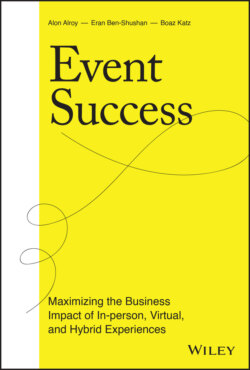Читать книгу Event Success - Alon Alroy - Страница 8
Overcoming a History of Inertia
ОглавлениеEvents are such natural value creators that the industry behind live events has long faced a strong resistance to change. After all, events often accomplished the desired outcome for those who were organizing them, at least to the extent that they could measure that success, so who would take a costly gamble on change?
Furthermore, many organizations operate around a single annual flagship event, which would be the last place they wanted to experiment. You know the feeling of being on your toes, putting out metaphorical (or perhaps in some cases, literal) fires as they arise. In this high-stress environment, the safe option is often preferred, even at the cost of innovation. We can't blame anyone who's trying to facilitate an experience for 100, 1,000, 10,000, or 100,000 people for being risk averse, for falling back on tried-and-true methods and processes, for taking the route that gives them one less thing to worry about in the midst of their big event.
The other reason for such strong inertia in the events industry was that experimentation was also risky on an individual level. If your higher-ups think last year's event went well, why risk drastic changes that could threaten your career? Event organizing can be a thankless job. Having your event run smoothly is a baseline expectation. Sure, there are minor problems that can be improved on from year to year, but most changes go unnoticed—unless they cause a problem. Why risk your career to advocate for change when nobody is calling for it?
Obviously, this is a broad characterization. There are plenty of exceptions, many of which we will highlight in these very pages. Countless event heroes out there shook things up, pushed the needle, and took chances, and we wholeheartedly celebrate their boldness.
But while most industries were adopting an evolve-or-die mentality in the early 2000s and into the 2010s as a result of rapid technological innovation, the events industry found itself naturally inclined to take the opposite route. Rather than feeling pressured to evolve, as so many industries did during that time, event organizers were often under pressure to repeat last year's success—which was based on the year prior, which was based on the year before that, and so on.
According to industry thought leader Marco Giberti, “The formula works well, and it's successful, and it's growing, and it's sustainable in many ways.” He told us recently over Zoom, “Most organizers—corporate, for profit, or associations—were using a playbook that was solid and successful, growing nicely, and the overall reaction was, ‘Why should I change if this is working?’ There's no urgency for deep innovation, there's no urgency for transformation, because it's going pretty well.”
That old playbook, however, has since been rendered obsolete. For the first time, event organizers are now finding themselves in completely uncharted territory and are now being challenged to reinvent an industry long resistant to change.
